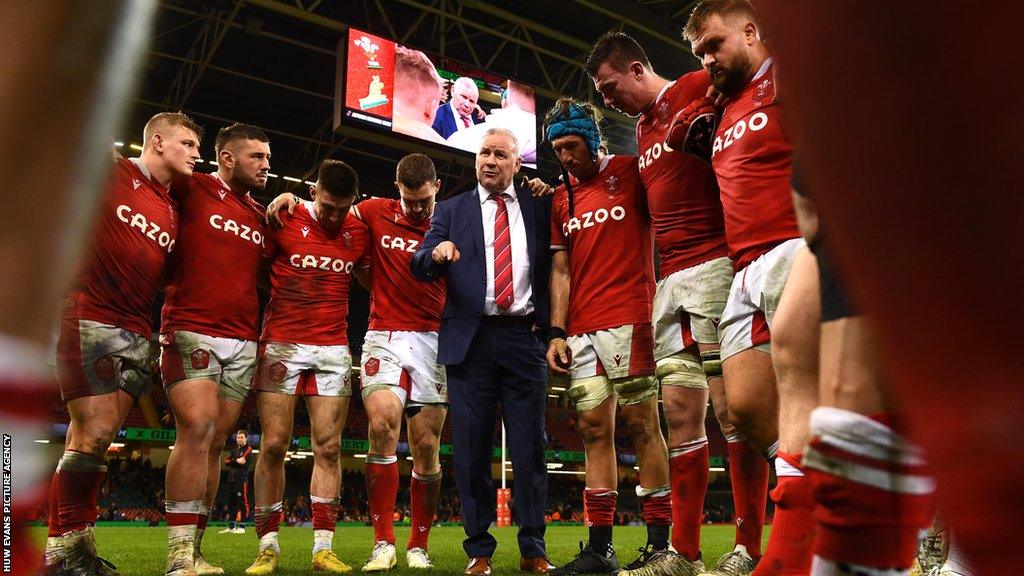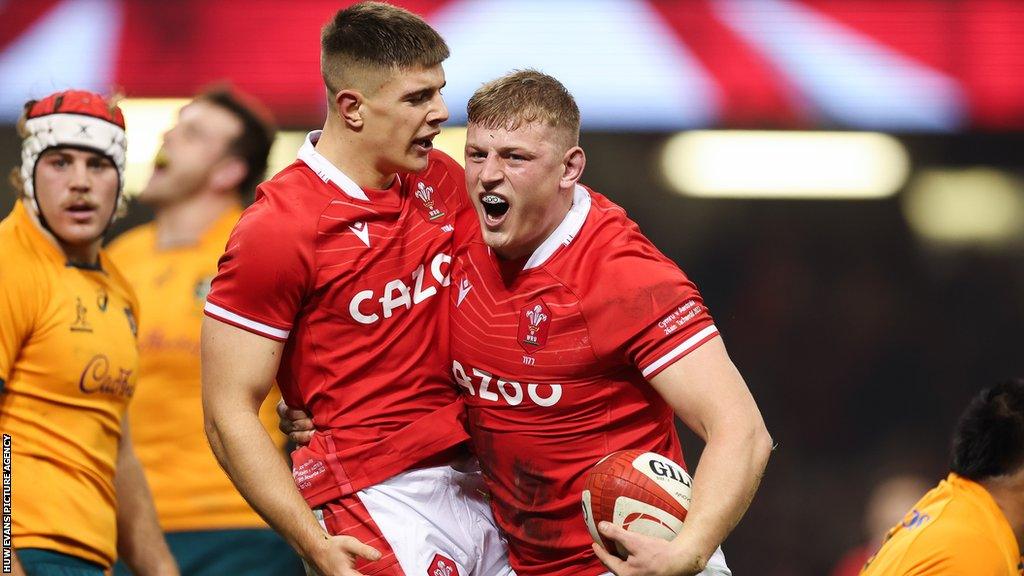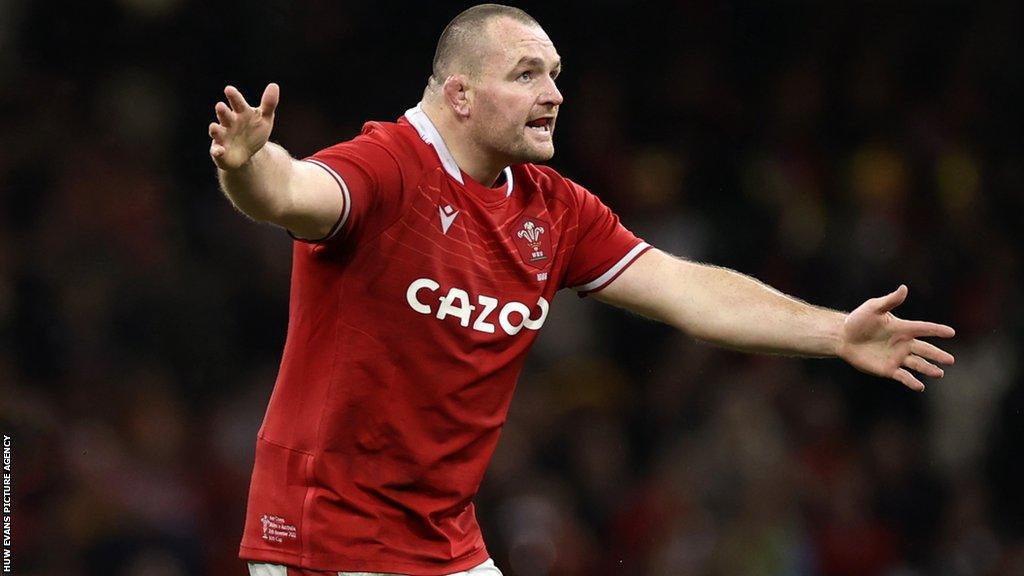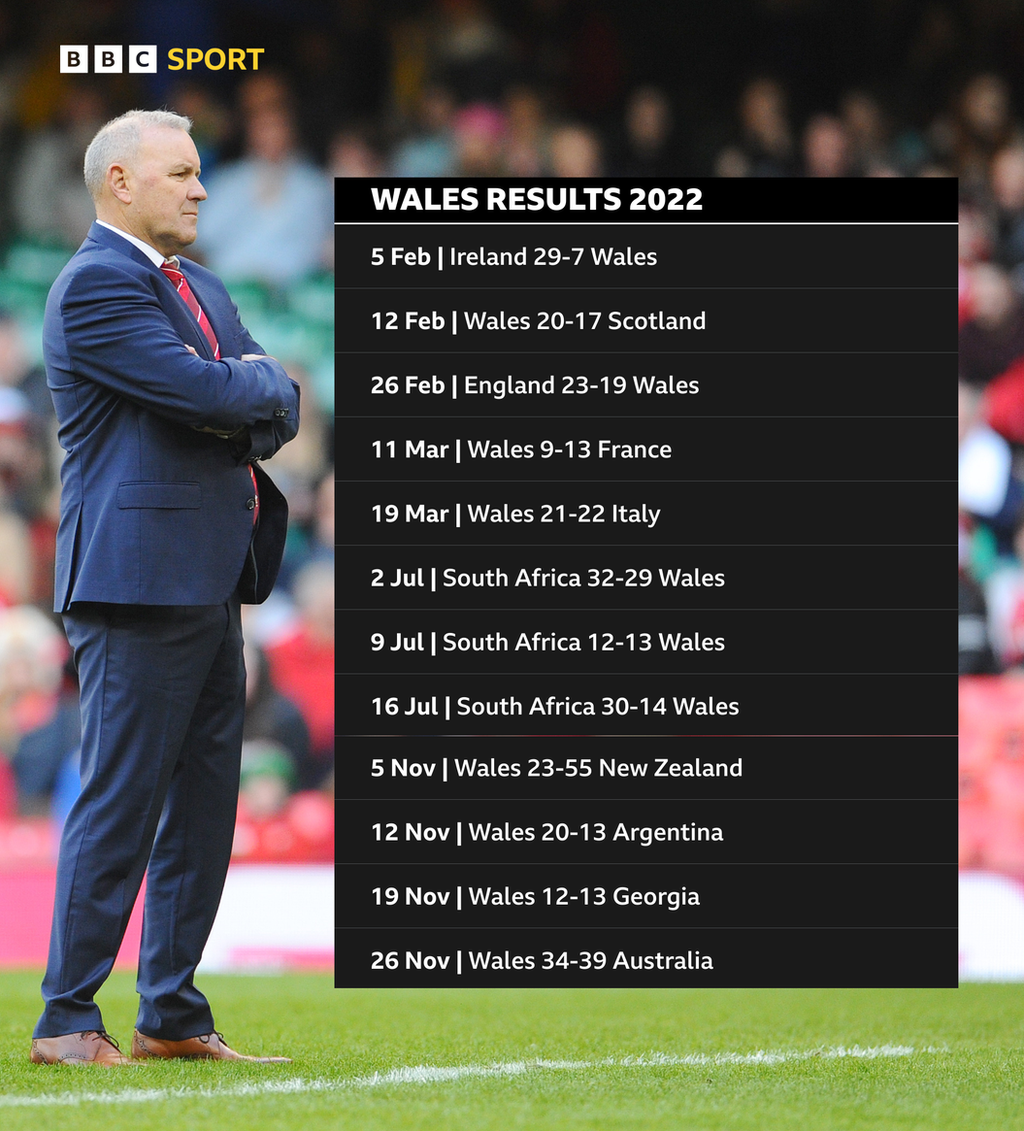Wales' class of 2022 endure a year to forget with World Cup looming
- Published

Wales players in a huddle after a 39-34 defeat against Australia
So there we have it, the 2022 fixture list is over for the Wales rugby team.
With a Welsh Rugby Union (WRU) review into the failed autumn campaign pending, there may well be twists and turns on the coaching front over the next few days.
Wayne Pivac's future is in doubt with Warren Gatland a target for a potential short-term return.
But for the players, the international year is over. They will return to their clubs and regions until the Six Nations begins in February.
Over the years, Wales players have often come into a winning national set-up after being involved in struggling regional squads, but a win ratio of 25% in 2022 for Pivac's men shows that is no longer the case.
The statistics are stark: 12 games, nine defeats and just three wins, against Scotland, South Africa and Argentina.
There have been three blocks of matches - the Six Nations, the summer tour of South Africa and autumn series - with only one win coming in each section and no successive victories.
Wales started the year eighth in the world rankings and finish ninth.
But they find themselves closer to Japan and Samoa, who are 10th and 11th respectively.
Not the preparation you want, then, 10 months before a World Cup where Australia, Georgia, Fiji and Portugal await in the pool.
More bust than boom
It was a year to forget with Welsh rugby often associated with a boom-and-bust culture but 2022 has had many more negatives than positives.
The high? In July, Pivac's team became the first men's Welsh side to defeat the Springboks in South Africa, a week after almost winning the first Test in Pretoria. Those heady days now seem a long way away.
The lows? In no particular order, being hopelessly outmuscled by Ireland in the Six Nations and becoming the first Wales side to lose at home to Italy and Georgia.
Then there was a 55-23 hammering by New Zealand, before throwing away a 21-point lead against Australia by leaking 26 unanswered points in 20 minutes.
Wales scored 20 tries in five games during their 2021 Six Nations title success. In 12 games in 2022, they managed 22.
The most alarming aspect has been the attacking shape on display, although it was arguably at its most impressive in the final game of the year against Australia, at least for the first hour.
Under Gethin Jenkins, the defence was one of the few positives during the Six Nations campaign, when Wales conceded just eight tries in five matches, despite the defending champions only finishing fifth in the tournament.
There were seven tries leaked in the three-Test summer tour of South Africa before 15 were conceded in the four autumn internationals, eight of them against the All Blacks.
Any reasons to be cheerful?

Jac Morgan is congratulated by his Ospreys team-mate Joe Hawkins after scoring against Australia
Exuding positivity from this desperate year is difficult, admittedly, but whoever leads Wales in 2023 will have some tools to work with.
Wales have unearthed some young talent, with Pivac taking the number of new caps handed out during his reign to 31.
Some look born for international rugby, with impressive performances at different times.
Ospreys hooker Dewi Lake, 23, excelled during the Six Nations and in South Africa before missing the autumn through injury.
Leicester flanker Tommy Reffell, 23, was outstanding against the Springboks before picking up a rib problem against New Zealand.
This paved the way for the emergence of Jac Morgan, 22, who was one of the stars of the autumn, after being left out of the squad that went to South Africa having been told by Pivac to bulk up.
Morgan produced an impressive replacement appearance in the Argentina win before scoring two tries apiece against Georgia and Australia.
His virtuoso display against the Wallabies underlined Morgan has the physicality and power to excel on the international stage.
Then there are players like Rio Dyer, 22, and Joe Hawkins, 20, who have demonstrated glimpses of their talents, while Exeter duo Christ Tshiunza, 20, and Dafydd Jenkins, 19, have been capped in the last 12 months.
Life in the old dogs yet?

Ken Owens is Wales' most-capped hooker with 86 Tests for his country
Wales have been relying on some over-30s to get through to the World Cup and there have been questions about whether France may come too late for them.
Hooker Ken Owens, 35, started the year recovering from a serious back injury and wondering whether he would play again.
Owens has battled back emphatically by starting all four autumn internationals.
Flanker Justin Tipuric, 33, returned to captain the side in November in the absence of Dan Biggar, 33, who has been sorely missed during the autumn.
Number eight Taulupe Faletau, 32, consistently maintains his status as Wales' leading performer, although he was challenged this year by Dragons lock Will Rowlands, 30, who enjoyed a stellar 12 months in a losing side.
George North, 30, has returned from a serious knee injury and benefited from starting the past seven Test matches at outside centre.
Then there is the most distinguished veteran in world-record cap holder Alun Wyn Jones.
Missing for the majority of the Six Nations with a shoulder injury, 37-year-old Jones returned for the defeat against Italy, his 150th Wales cap.
Jones was used as a replacement in the three South Africa Tests and defeat by New Zealand, when he was advised to retire by Springbok legend Tendai Mtawarira.
After being omitted from the squad against Argentina and Georgia, Jones returned for Australia and showed former South Africa prop Mtawarira and the rugby world that he still belongs at international level.
The challenge for Jones will be to maintain that standard for another year as he aims for a fifth World Cup when he will be 38 during the tournament.
Then there are others like Josh Navidi, 31, Liam Williams, 30, and Dan Lydiate, 34, who have been missing for periods through injury. Fly-half Gareth Anscombe, 31, also suffered a shoulder problem against Australia after an encouraging display.
What happens next?
The most pressing thing is the review into the autumn, which will determine Pivac's future.
A speedy resolution is required because the Six Nations opener against world number one side Ireland is only two months away.
Also, if Pivac is to be replaced - and WRU bosses know this already - he deserves to be told quickly and not left hanging on.
He is a decent man who has always fronted up when the chips have been down. People have not always liked his explanations for his selections and Wales' shortcomings but he has publicly held his position with dignity.
While this review is the short-term answer to get through to the next World Cup, the WRU should also ensure a long-term assessment is carried out on how the governing body is being run.
These results have not happened by accident and are the product of the system the Wales team exists within.
The WRU and four regions need to agree a financial deal to protect the future of professional rugby in Wales.
That should ultimately be the domain of WRU chief executive Steve Phillips, who has to prove he can navigate the troubled waters of Welsh rugby, alongside a new chair who is set to be appointed this week.
The job of performance director Nigel Walker should be to provide a long-term, coherent strategy, which is currently sorely lacking, to help solve the problems of the creaking Welsh game.
Walker has been in post for 18 months and has helped deliver professional contracts for the women's game.
His focus now must also be on the men's system, to ensure the 2022 results are not repeated, or even worse, become a regular occurrence.

Wayne Pivac's overall international record as Wales coach is 13 wins, 20 defeats and a draw since he took over from Warren Gatland in 2019